
An artist's rendering of the KC-45 tanker during a refueling mission
The notion that military spending is all about national defense rather than hometown pork is being seriously tested by the firestorm triggered by last week's awarding of a $40 billion Air Force contract to a joint venture including the European parent of Airbus. The European Aeronautic Defense and Space Corporation and the U.S.-based Northrop Grumman beat out Boeing in the race to supply aerial tankers, making a foreign corporation responsible for a key piece of U.S. military hardware.
Irate lawmakers this week threatened to delay the contract because they believe the Air Force unfairly tilted the award to the European firm — a charge the Air Force rejects. Boeing has said it may launch a formal protest after it gets an Air Force briefing explaining the decision on Friday. The initial contract is for 179 planes over 15 years to refuel the Pentagon's fighters and bombers in mid-air. Ultimately, it could balloon to 500 planes worth about $100 billion.
Boeing's backers on Capitol Hill argue that the Air Force should have factored in damage to the U.S. industrial base — and the loss of American jobs — by letting the contract to the foreign firm. (The Airbus team claims its deal will support 25,000 U.S. jobs, but Boeing says it would have created more.) Underscoring the sensitivity of the topic on Capitol Hill, a top Air Force official addressing a House hearing on Wednesday referred to the winning bid using only the name of its American partner. "Northrop Grumman brought their A-game" to the competition, said Air Force procurement chief Sue Payton. Critics were unimpressed: "Northrop's a front," countered Rep. Dave Hobson, R-Ohio.
But the real problem on the Boeing side of the argument is that no one protested Airbus' role as one of two contenders for the contract when everyone thought Boeing had the deal sewn up. In other words, they liked the appearance of competition, but not its reality.
The debate has shifted not only from national security to jobs, but to politics as well. That's because Senator John McCain, the presumptive G.O.P. presidential nominee, fought against an earlier Boeing tanker pact, which was found to be tainted — and therefore required the new bidding process won by the Airbus-led team. "I've always felt that the best thing to do is to create the best weapons system we can at minimum cost to taxpayers," McCain said after the announcement. But presaging the fall campaign — where a shaky U.S. economy will be front and center — both Democratic contenders have criticized the award. Senator Hillary Clinton said she was "deeply concerned about the Bush Administration's decision to outsource the production of refueling tankers for the American military." Senator Barack Obama, who represents Chicago, where Boeing is headquartered, said it is difficult for him to believe "an American company that has been a traditional source of aeronautic excellence would not have done this job."
But the hard fact about the Air Force's choice is that it represents the downside of globalization. As economies of scale whittle away at the number of companies building a given product, inevitably a crafty customer is going to have to look worldwide for the best buy. It wasn't so long ago that Boeing could count on the McDonnell Douglas Aircraft Co. to keep it honest in dealings with the Pentagon. After all, that esteemed company built the KC-10 tanker for the Pentagon a generation ago, after beating out Boeing for that contract.
But Boeing gobbled up McDonnell Douglas a decade ago, leaving Boeing the lone American manufacturer of large airframes. Apparently, Boeing's boosters want the company to have a guaranteed monopoly on selling big airplanes to the U.S. military. But the prize market, of course, remains commercial aviation. On Wednesday, Toyota announced it may soon develop a new generation of fuel-efficient passenger airplanes. If Boeing's boosters get their way, the company can grow fat and lazy at the Pentagon trough, while innovations and breakthroughs come from companies like Airbus — and ultimately, perhaps, Toyota — fighting for every sale.
